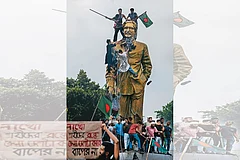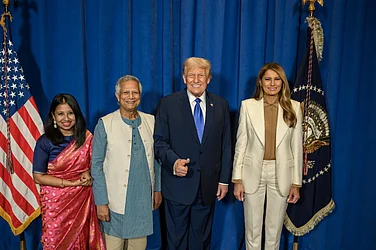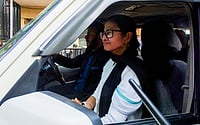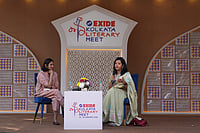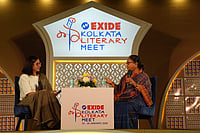Buker Bhetor Onek Jhor
Buk Petechhi, Guli Kor
(My chest is roaring with storms/ Shoot me in the chest)
– A popular slogan of Bangladesh’s student-led uprising
It was the longest July. The month ended on the 36th. The world knows it as August 5, 2024. However, the student-led anti-government protesters who toppled Prime Minister Sheikh Hasina’s 15-year rule in Bangladesh, call it 36th July. The three-week-long pitched battle since the midnight of July 14 recorded over 500 deaths, mostly students and youths. August brought them freedom from an authoritarian rule. It marks a fresh start. How long will August last?
Following Hasina’s resignation and hurried exit from the country on August 5, sweeping changes are taking place. Leaders of Hasina’s Awami League (AL)—the party that led Bangladesh’s Liberation War in 1971 and now faces widespread condemnation for turning rogue—are either landing in jail or lying low. Some are suspected to have secretly left the country. Heads are rolling in the higher judiciary, the army, the police, the civil administration, educational institutions and even media organisations.
While these are being described as part of ‘cleansing the system of all fascist traits’, bigger changes like rewriting the Constitution and rewriting the country’s history are also on the cards. What makes all these changes all the more interesting is that it is unlikely to be a swing from one extreme to another, at least at this moment, as the new leadership that emerged through this upsurge has had a specific plan of breaking this very binary.
At the core of the Students Against Discrimination (SAD) platform—an umbrella of various organisations that spearheaded the overthrow of Hasina—were the leaders associated with Ganatantrik Chhatra Shakti (Democratic Student Force). The DSF was launched in October 2023 on the Dhaka University campus. It had ‘restructuring of the state and the political system’ on its agenda right from the beginning.
At the launch event, they described the organisation’s ideology as “accountability, empathy and human dignity” and its political position as moderate-democratic. It aimed to deconstruct the socio-political-cultural system through nationwide education reform movements and student-citizen politics. Its leaders spoke of rescuing the country from the cycle of the “Shapla-Shahbag binary and one-eleven.”
In Bangladeshi socio-political parlance, Shahbag refers to the secular-liberal-atheist camp’s 2013 agitation at Dhaka’s Shahbag Square demanding capital punishment for the Jamaat-e-Islami (JeI) leaders who opposed the 1971 Liberation War and collaborated with the Pakistan Army. Shapla refers to Islamic fundamentalist trends derived from Hefazat-e-Islam’s (HeI) counter-initiative, which culminated in their massive gathering at Shapla Square in Dhaka the same year demanding an Islamic way of life.
One-eleven refers to military interventions, which have long been the third alternative forced upon Bangladesh’s people. Since AL stalwart and Bangladesh founding-President Mujibur Rahman’s assassination in 1975, successive military governments ruled Bangladesh till 1990. The term one-eleven refers to January 11, 2007, when the Army took over the government after 15 years of electoral government rule followed by a brief period of an interim government.
The DSF organisers call the trends exhibited by the Shahbag movement as ‘cultural fascism’ of Rahman’s followers and the Shapla gathering as representing the ‘social fascism’ of Islamic forces. They argued that the time had come for Bangladesh to go past all these alternatives.
“This mass upsurge has shattered the old structure of Bangladesh’s nation-state. The old State has collapsed ideologically,” Mahfuj Abdullah, whom many describe as the intellectual and strategic brain behind the July Upsurge, announced in a social media post after the formation of the interim government.
Abdullah currently heads the liaison committee between the interim government and the SAD. He says they are trying to reform the system in a way that any party that comes to power in the future will not be able to bypass accountability.
He, along with Nahid Islam and Asif Mahmud—the student representatives in the interim government—are at the nucleus of the DSF. The choice of Nobel Peace Prize Laureate economist Muhammad Yunus as the head of the interim government is also theirs.
Yunus, whom Hasina evidently disliked, if not hated, had his own political ideas. This is not the first time Yunus got a chance to head the government. In January 2007, in the event known as one-eleven, the army first approached him to take charge as the new head of the army-backed government. Yunus declined. Soon, when Bangladesh was still under the Emergency rule, Yunus started seeking public opinion for launching a new political party through his open letters published on mass media outlets.
The proposed party, Nagarik Shakti (Citizen’s Force), would work towards the realisation of the dreams of the 1971 Liberation War and social unity. The party’s ideology will be secularism, democracy and good governance free from corruption and politicisation, he had said.
While Yunus had to botch the initiative at that time due to a lack of interested people joining him, the July 2024 student movement allowed him a chance to implement what he dreamt of, as the ideas of Yunus and the DSF leadership have many similarities. The question is, do they have any control?
The Prelude
Students in Bangladesh have been angry for a long time, bursting out at intervals. They shook Bangladesh’s conscientious people in 2018, when, fed up with road accident deaths, they took to the streets in July-August 2018. It coincided with another student movement—the second phase of the 2018 quota reforms movement that faced police repression and attacks by the ruling party’s student wing.
The raw language of the road safety movement’s slogans, which often included expletives, shocked many. Amar Bhai Roktey Laal, Police Kon Chya**r Ba*l, which loosely translates to ‘my brother is covered in blood/ who the f*** are the cops’, was painted on roads and walls and rented the air. “Police ch*** na, lathicharge ch*** na” (translating to ‘we don’t give a f*** to police or lathicharge’) went clear and loud.
Police uniforms are likely to be changed to symobolise the new police. Laws considered repressive are likely to be modified.
If such slogans reflected deep-seated anger, students also showed a sense of urgency by announcing a ‘State-repairing’ programme. They took upon themselves the task of checking the papers of every vehicle—no matter whether it carried an influential industrialist or an army official. A poster put up by the students by the side of a road in Dhaka symbolised the student’s will: “Work of repairing the State going on. We apologise for the temporary inconvenience.”
Since then, rashtro meramoti or repairing the State became a catchphrase. The 2020 anti-rape movement carried a similar spirit. Spearheaded by school and college students, it came up with slogans like Buker Bhetor Onek Jhor, Buk Petechhi, Guli Kor (My chest is roaring with storms/Shoot me in the chest).
Participants and leaders of all these movements—the quota reforms, roadway safety and anti-rape agitations—coalesced into the July 2024 protests. If the likes of Nahid Islam and Asif Mahmud rose from the 2018 anti-quota movement, the likes of Farzana Sithi rose from the road safety and anti-rape movements. Therefore, slogans from all these past agitations—from Amar Bhai Rokte Laal… to Buker Bhetor Onek Jhor…—came together in 2024.
Since the dramatic fall of Prime Minister Sheikh Hasina’s mighty government, that mission of repairing, or rather reconstructing, Bangladesh has gained momentum.
The Reforms
Rescuing the country’s historical narrative from a ‘biased, Mujib-centric narrative imposed by the AL’ is among the top agenda, as it is part of the student leadership’s plan to break the politico-cultural binary of Bangladeshi society.
Police uniforms are likely to be changed to symobolise the new, non-partisan police. Laws considered repressive are likely to be scrapped or modified. The Election Commission will be reconstituted. Provisions banning anyone from serving more than two terms as the Prime Minister or the President are being discussed. Bringing the perpetrators of July violence to justice is another priority.
Nahid Islam told the media in Dhaka that they want to focus on building a national character breaking the ‘culture versus religion’ binary—in which cultural and religious identities can coexist. Taking the country’s history beyond the 1952-1971 timeline is necessary for this. The student leadership is currently planning to expand their SAD platform to a student-citizen joint platform. Many see this initiative as the first step towards launching a new political party.
In most ways, the student leadership wants to take the middle path. As one of the SAD members explains: “We oppose both Mujibur Rahman’s deification and vilification. We want an objective, unbiased evaluation.” They neither want to pursue a Bangladesh Nationalist Party (BNP)-JeI alliance-type inimical attitude towards India nor want to toe AL’s ‘policy of total surrender’.
There seems to be a broad consensus among various dominant political groups about turning Bangladesh into a “liberal democracy”, with pro-US inclinations rather than pro-India, pro-China or pro-Pakistan. The BNP has started distancing itself from its long-term ally, the JeI, and highlighting itself as a liberal-democratic force.
Lurking Danger
August did not start taint-free. Hours within Hasina’s exist, Bangladesh descended into lawlessness, as all the police fled from their stations. For about a week, loot, arsons, robberies, targetting AL leaders, minority communities and their places of worship and business establishments as well as public properties and banks, kept people deeply concerned. They have mostly stopped since mid-August.
The sudden freedom has activated all other forces that the Hasina regime had suppressed. If a section of students started covering all walls within their reach with colourful graffiti highlighting the anti-discrimination spirit of the upsurge—which many call the country’s second Independence —the imprints of Islamic fundamentalist forces were rather evident in some other acts.
Among them is the targetted vandalism of sculptures themed on Greek and Roman goddesses and those representing the 1971 Liberation War. A road sign was changed to rename the road after Prophet Ibrahim, who was also declared the ‘Father of the Nation’ in that sign. Some Islamic clerics are making inflammatory or provocative comments on social media platforms. Noticeably, these actions are facing widespread condemnation from the students, civil society and even commoners.
Since the dramatic fall of Hasina’s government, the mission of repairing, or rather reconstructing, Bangladesh has gained momentum.
At the same time, a trend of suppressing pro-AL voices of the past is raising its head, which many see as a potential threat to the freedom of expression that the upsurge promised. Public intellectuals like economist Anu Muhammad, as well as many commoners, have warned against entertaining such trends and called for nipping them in the bud.
The student leadership has little organisational strength outside of campuses. It needs the BNP’s cooperation, especially in restoring peace and carrying out administrative and structural reforms. It needs cooperation from the Army, which has been playing a critical role in this transforming phase by carrying out all law-and-order duties. Besides, there is the United States, which many fear is trying to turn the new government into its puppet.
According to a Dhaka University teacher who did not want to be identified, the new government’s power does not come from any organised strength. “It comes from the people’s collective aspirations and trust in the student leadership,” says the teacher. She argues that it is in acknowledgment of the popular support that the army—in a break from tradition—played a positive role in implementing the wishes of the people embodied by student leadership. The BNP and JeI’s cooperation also comes from acknowledging this support.
According to Meghmallar Basu, who recently completed his graduation in peace and conflict studies from Dhaka University, the biggest gain from the movement is that people have started holding everyone accountable. The broad consensus is that the sacrifice of so many lives cannot be allowed to be usurped by harmful forces.
“At present, the likes of Nahid Islam and Asif Mahmud enjoy a high level of popularity. But people will not hesitate to criticise them if their activities indicate any departure from the spirit and promises of the anti-discrimination movement,” says Basu, a member of the leftist student organisation Bangladesh Chhatro Union.
MORE FROM THIS ISSUE
Let’s return to the question we asked in the beginning —if August signifies freedom, how long will August last? It perhaps depends a lot on how the students follow the doctrine that some have painted on a Dhaka wall:
Raja Jay Raja Asey
Dheu sheshe dheu
Bidroho jari rekho
Jitey geleo
Rulers rise and fall
So do waves
And rebellion must go on
Even after we have won
(This appeared in the print as 'Roaring With Storms')







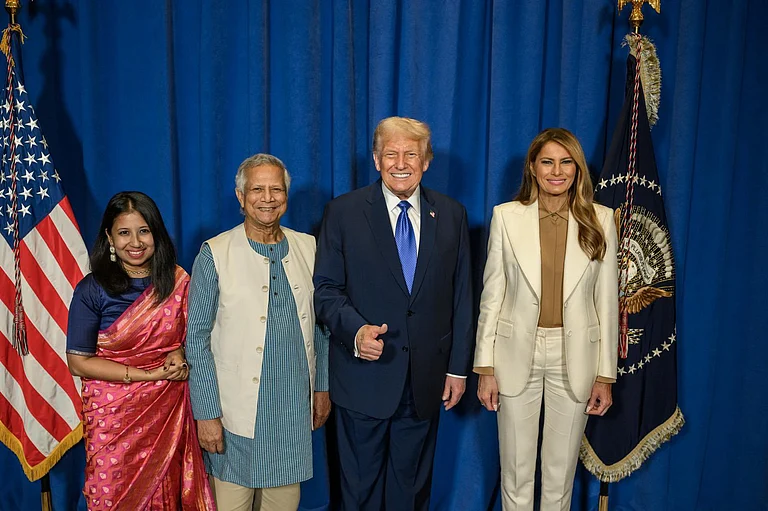
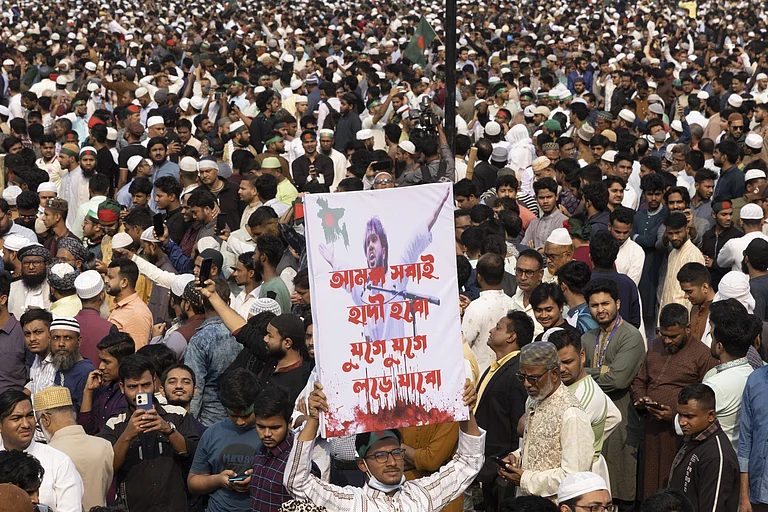

.jpg?auto=format%2Ccompress&fit=max&format=webp&w=768&dpr=1.0)






